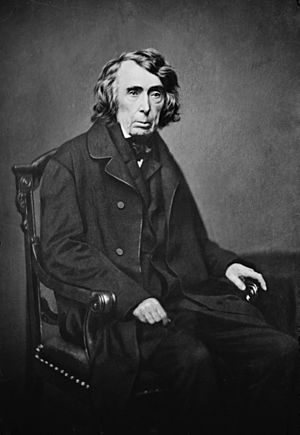Ex parte Merryman facts for kids

Ex parte Merryman was an important and debated U.S. federal court case during the American Civil War. It tested how much power the President had. Specifically, it questioned if the President could stop the right of habeas corpus when Congress was not meeting.
Habeas corpus is a legal term. It means that a person who is arrested has the right to be brought before a judge. The judge then decides if their arrest is lawful. This case also looked at whether the President could ignore court decisions if they thought those decisions were wrong or harmful to their powers.
Contents
What Was Ex parte Merryman About?
This case was about a man named John Merryman. He was a well-known farmer from Baltimore County, Maryland. Merryman was arrested at his home during the Civil War.
He was held as a prisoner at Fort McHenry in Baltimore. This meant he could not talk to judges or other legal authorities.
The Role of Chief Justice Taney
U.S. Supreme Court Chief Justice Roger B. Taney heard Merryman's case. Taney made a ruling that was very important.
He decided that only Congress had the power to stop the right of habeas corpus. The President, he said, did not have this power. This idea comes from a part of the Constitution called the Suspension Clause.
The President's Response
The President at the time was Abraham Lincoln. His government, including the United States Army, did not agree with Chief Justice Taney's decision.
They did not follow the Merryman ruling. This showed a big disagreement between the President and the Supreme Court during the war.
Why Is This Case Still Discussed?
The Ex parte Merryman case is still talked about today. This is because some parts of the decision are not clear.
It was decided very quickly, which added to the confusion. The case highlights the ongoing debate about the powers of different parts of the U.S. government. It shows how the powers of the President, Congress, and the courts can sometimes clash.
 | Tommie Smith |
 | Simone Manuel |
 | Shani Davis |
 | Simone Biles |
 | Alice Coachman |

